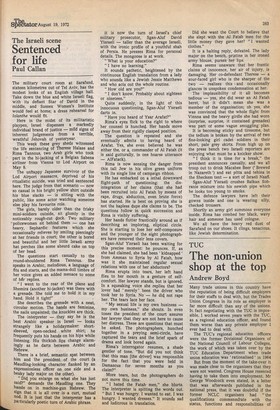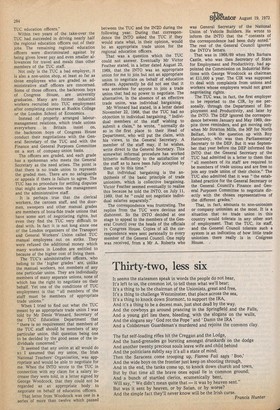TUC
The non-union shop at the top
Andrew Boyd
Many trade unions in this country have the reputation of being difficult employers for their staffs to deal with, but the Trades Union Congress in its role as employer is far more difficult than any of the unions. Ir. fact negotiating with the TUC is impossible. I worked seven years with the TUC, as a regional education officer, and found them worse than any private employer I ever had to deal with.
The TUC's regional education officers were the former Divisional Organisers of the National Council of Labour Colleges, the work of which was taken over by the TUC Education Department when trade union education was 'rationalised ' in 1964 But from the moment of the take-over it was made clear to the organisers that they were not wanted. Congress House resented having to take them into employment. Mr George Woodcock even stated, in a letter that was afterwards published in the national press, that it was doubtful if the former NCLC organisers had "the qualifications commenstirate with the status, functions and responsibilities of TUC education officers."
Within two years of the take-over the TUC had succeeded in driving nearly half the regional education officers out of their jobs. The remaining regional education officers were discriminated against by being given lower pay and even smaller allowances for travel and meals than other members of the TUC staff.
Not only is the TUC a bad employer, it is also a non-union shop, at least so far as those employees who are graded as administrative staff officers are concerned. Some of those officers, the backroom boys of Congress House, are university graduates. Many are former industrial workers recruited into TUC employment after completing courses at Ruskin College or the London School of Economics.
Instead of properly arranged labourmanagement relations, which trade unions everywhere in Britain insist on, the backroom boys of Congress House conduct their negotiations with the General Secretary of the TUC and with the Finance and General Purposes Committee on a sort of company union basis.
The officers are graded, and each grade has a spokesman who meets the General Secretary as the need arises. The point is that there is no trade union to represent the graded men. There are no safeguards or appeals if there is failure to agree. The TUC has no procedure for settling disputes that might arise between the management and the administrative staff.
It is perhaps true that the clerical workers, the canteen staff, and the doormen, sweepers and other manual grades are members of bona-fide trade unions that have some sort of negotiating rights, but even they find the TUC very difficult to deal with. In fact it is not long since one of the London organisers of the Transport and General Workers' Union called TUC manual employees out on strike. They were refused the additional money which many workers in London are entitled to because of the higher cost of living there.
The TUC's administrative officers, who belong to the ' higher grades' are, unlike the manual workers, not members of any one particular union. They are individually members of many separate unions, none of which has the right to negotiate on their behalf. Yet one of the conditions of TUC employment is that "all members of the staff must be members of appropriate trade unions."
When I tried to find out what the TUC meant by an appropriate trade union I was told by Mr Denis Winnard, Secretary of the TUC Education Department that "there is no requirement that members of the TUC staff should be members of any particular union, that question being one to be decided by the good sense of the individuals concerned."
It seemed that any union at all would do SD I assumed that my union, the Irish National Teachers' Organisation, was appropriate and would be able to negotiate for me. When the INTO wrote to the TUC in connection with my claim for a salary increase they were told, in a letter signed by George Woodcock, that they could not be regarded as an appropriate body to negotiate on behalf of education officers.
That letter from Woodcock was one in a series of more than twelve which passed between the TUC and the INIO during the following year. During that correspondence the INTO asked the TUC if they would state what, in their opinion, would be an appropriate trade union for the regional education officers.
That was a question which the TUC could not answer. Eventually Mr Victor Feather stated, in a letter dated August 25, 1969, that the INTO was an appropriate union for me to join but not an appropriate union to negotiate on behalf of education officers. Apparently he did not see that it was senseless for anyone to join a trade union that had no power to negotiate. The alternative, in the absence of an effective trade union, was individual bargaining.
Mr Winnard had stated, in a letter dated November 22, 1968, that the TUC had no objection to individual bargaining. "Individual members of the staff wishing to submit a claim," he wrote, "normally do so in the first place to their Head of Department, who will put the claim, with his views, to the General Secretary. A member of the staff may, if he wishes, write direct to the General Secretary. This somewhat informal procedure has worked hitherto sufficiently to the satisfaction of the staff as to have been fully accepted by them up to this time."
But individual bargaining is the anthithesis of the basic principle of trade unionism, which is collective bargaining. Victor Feather seemed eventually to realise this because he told the INTO, on July 11, 1969, that he "could not negotiate individual salaries separately."
The correspondence was frustrating. The replies from the TUC were devious and dishonest. So the INTO decided at one stage to appeal to the members of the General Council over the heads of the officials in Congress House. Copies of all the correspondence were sent personally to every member of the General Council. One reply was received, from a Mr A. Roberts who was General Secretary of the National Union of Vehicle Builders. He wrote to inform the INTO that the "contents of the correspondence had been duly noted." The rest of the General Council ignored the INTO's letters.
That was in 1968/69 when Mrs Barbara Castle, who was then Secretary of State for Employment and Productivity, had appointed the Commission on Industrial Relations with George Woodcock as chairman at E11,000 a year. The CIR was supposed tn deal with complaints from unions and workers whose employers would not grant negotiating rights.
The TUC was, in fact, the first employer to be reported to the CIR, by me personally, through the Department of Employment and Productivity, and later by the INTO. The DEP ignored the correspondence between January and May 1969, despite three reminders, and got moving only when Mr Stratton Mills, the MP for North Belfast, took the question up with Roy Hattersley, who was then Parliamentary Secretary to the DEP. But it was September that year before the DEP informed the INTO that the General Secretary of the TUC had admitted in a letter to them that "all members of its staff are required to be members of trade unions and are free to join any trade union of their choice." The TUC also admitted that it was "the established practice for the General Secretary or the General Council's Finance and General Purposes Committee to negotiate directly with the chosen representatives of the different grades."
That, in fact, amounts to non-unionism or company unionism at the most. It is a situation that no trade union in this country would tolerate in any other sort of employment. That the TUC, its staff, and the General Council tolerate such a system is an indication of how little trade unionism there really is in Congress House.

































 Previous page
Previous page